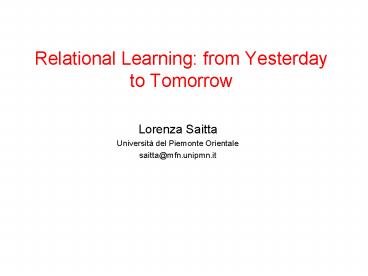Relational Learning: from Yesterday to Tomorrow - PowerPoint PPT Presentation
Title:
Relational Learning: from Yesterday to Tomorrow
Description:
Relational Learning: from Yesterday to Tomorrow. Lorenza Saitta ... Muggleton's CIGOL Quinlan's FOIL. ILP. Automatic programming. Strongly logic-oriented. ... – PowerPoint PPT presentation
Number of Views:42
Avg rating:3.0/5.0
Title: Relational Learning: from Yesterday to Tomorrow
1
Relational Learning from Yesterday to Tomorrow
- Lorenza Saitta
- Università del Piemonte Orientale
- saitta_at_mfn.unipmn.it
2
Why did I choose this topic?
- This is how I knew Yves existence
- As a team, we have worked on the topic since its
beginning, knowing thus its hopes and deceptions - The topic is fascinating and rich of fundamental
issues for understanding learning in both humans
and machines - Warning
- This is NOT an overview of the field, but a
collection of personal reflexions
3
Relation Learning has a peculiar history
- Negative point it is conceptually hard and
computationally demanding - Positive point it is apparently more close to
human learning, w.r.t. previous Pattern
Recognition approaches (even the syntactic ones) - Michalskis Human comprehensibility principle
- Instead of a progression easy ? difficult in
the research topics, we have seen, at the
beginning, researchers launching themselves into
RL with great enthusiasm, but a scarse sense of
the feasible
4
The power of names
- The consequence is a history of déjà vu, of dead
ends, and of difficulties periodically
re-emerging, that researchers try to solve again
and again - Solution Restart and change the label
- FOL Learning ILP
SRL - It would be unfair to say that at each restart
everything is the same. Some novelties are added
each time - As restart is an effective technique in search,
maybe it will be also effective for RL in the
long term
5
The ambition of the origins
- ML started officially in 1980 Pittsburgh
workshop - RL is much older 1970
- Meltzer Inverting deduction E1, E1 V
E2 - Morgan
- Plotkin ?-subsumption
- Winston ARCH -gt Near-misses
- Vere TOTH -gt Counterfactuals
- Conceptually interesting and still up-to-date
today - Computationally infeasible, but, at the time,
this was not an issue. The proposed algorithms
were not meant to work they were ideological and
explorative in nature. - It is quite surprising that the first learning
approaches (except Samuels checker) were
actually relational. - RL attracted researchers as honey attract
flies as we say in Italy
6
Keeping feet on the ground
- But learning IS meant to work, even if it is
relational - Under Michalskis influence, between 1980 and
1990 many systems have been designed and
implemented both in Europe and in the USA - Kodratoff et al.
- Giordana et al. Learning from a relational
datbase, 1988 - Esposito et al.
- Morik et al.
- But not just learning systems but source of
conceptual innovations - Mitchells and De Jongs EBL
- Ganascia Zuckers morions
- Carbonells learning in planning
- Some concrete results were obtained
7
Generality
- Crucial issue how to define the generality
relation if FOL? - Michalski
- Buntine
- Niblett
- Flach -gt Yves lives in France , Yves lives
in Paris - Kodratoff
- Console Saitta -gt Freges theory of concepts
- Generality ?
Information content - The discussion died, but it is a pity, because
the field got impoverished received view
?-subsumption or covering - Relationships with abduction and with abstraction
8
Inductive Logic Programming
- Muggletons CIGOL Quinlans FOIL
- ILP
- Automatic programming
- Strongly logic-oriented. Mostly based on
?-subsumption. High computational complexity - h(x,y) name of a relation (extension -gt
intension) - Attributes -gt Background knowledge
- Needs powerful bias or human help
- A theory of logical learning more than a
practical approach. - Some success in applications.
- Almost separated from mainstream ML.
- Extensions towards Reinforcement learning,
Clustering, Neural Networks.
9
Plateau and Phase Transitions
- The covering test shows a phase transition in a
range of parameters interesting for practical
learning approaches - Concept with more than 4 chained variables cannot
be learned due to the extremely high
computational complexity of the test. - Top-down, hypothesis-and-test-based relational
learning cannot go beyond stringent limits on the
complexity of examples and hypotheses. - Could top-down, data-driven approaches overcome
the limits?
10
Statistical relational learning
ILP
Probability
SRL
- Started by considering relations among examples
- Evolved toward probabilitic logic. Probabilistic
logics (PL) did not produce anything usable in
the past. - By putting together two difficult subjects, is it
possible that something simple will come out? By
interference ? - Several interesting ideas, but no definite
solution. Field at the beginning. - Domingos and Richardson (Markov networks)
- Kersting and De Raedt (Bayest neworks)
- Poole (Lifted inference)
- Koller et al. (Probabilistic nertworks -
Database-oriented approach)
11
P(X), Q(x) -gt R(X,Y) P(X), Q(x) -gt S(X,Y) Q(X),
Q(Y) -gt V(X,Y) -gt R(X,Y) a, b
12
Future?
13
I believe that the world market can be satured
by maybe five computers
Thomas
Watson, IBM Chairman, 1943 A 640 KB memory
should be sufficient for everyone"
Bill Gates, 1981 "Internet will undergo a
catastrophic collapse in 1996"
Robert
Metcalfe, Ethernets inventor
14
Guesses
- A radically new approach is needed to obtain
substantial steps ahead - NO Logic, but get close to (take inspiration
from) - Cognitive Sciences
- Human memory and learning
- More complex concept representation (Barsalou)
- Do the limitations to machine learning also apply
to human learning? - Complex Systems
- Graphs and networks
- Agent Based Modeling
- Simulation
- Statistical Phisics
- Ensemble phenomena
- Collective learning (emergent phenomenon)
- Abstraction and multi-resolution approaches
15
Guesses
- Investigating the foundations
- Phase transitions
- Kolmogorov complexity
- Chaitins theorem - Algorithmic version of the
Halt problem - No program of complexity n can generate a number
greater than n































